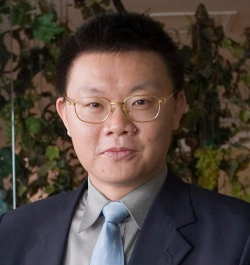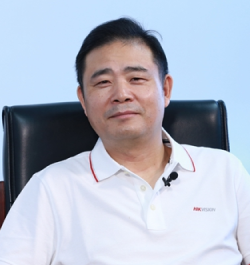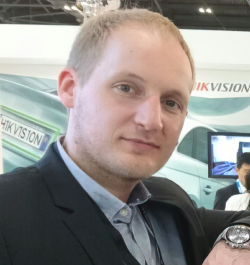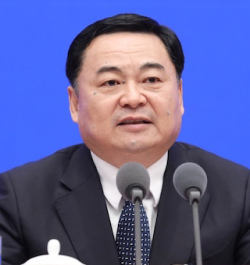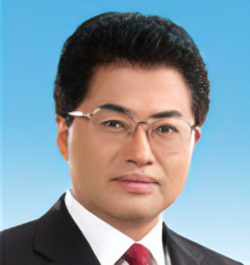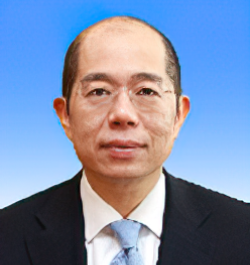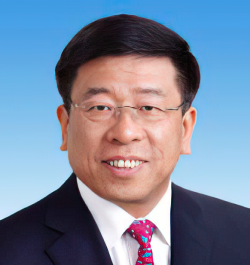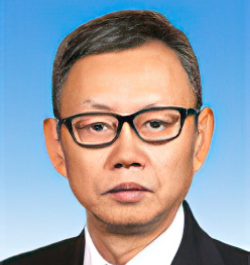Zhejiang DAHUA Technology Co., Ltd.

Dahua continues their activities in Russia. This is evidenced by the working official representative offices, the absence of statements about the termination of activities in the Russian Federation and the wide market of distributors supplying their goods.
Western brands Axis, Hanwha, Panasonic, Motorola, IBM, Milestone left the Russian market, which only fueled the activity of their Chinese competitors.
The Dahua business, represented by Dahua Technologies Rus LLC, is flourishing in the Russian Federation.
In March-April 2022, the company imported more than 3 tons of equipment from China primarily video cameras.
The amount of taxes paid to the budget of the Russian Federation for the previous reporting period amounted to 87 million rubles (about $ 690 000).
According to the ImportGenius resource, Dahau in 2022, after the start of the war, supplied goods that could be used for military purposes.
In addition, Dahua thermal imagers, drones and accessories for them are freely available in the Russian Federation. If drones can be used for military purposes with the help of refinement, then thermal imagers are used without it.
In September 2016, a major DDoS attack was carried out on the resource of American journalist Brian Krebs using a botnet (a group of devices, such as cameras, that are hacked or pre-configured to perform unwanted actions on the Internet). According to the ISP, Dahua cameras and video recorders were the most frequently infected devices in the botnet.
US officials have accused Dahua of participating in the crackdown taking place in the western region of Xinjiang, where about a million Uyghur Muslims have been detained in camps.
In this regard, an increasing number of countries prohibit the use of the equipment of this company in government structures, fearing possible espionage and adhering to moral standards.
In 2019, Donald Trump signed into law the National Defense Authority Act, which contains a clause that prohibits the purchase of Hikvision and Dahua video surveillance systems by US government agencies.
In 2022, the UK restricts the use of Chinese cameras in government buildings for security reasons.
In 2023, the Australian Department of Defense will remove all surveillance technology produced by China's Hangzhou Hikvision Digital Technology Co. and Zhejiang Dahua Technology Co. from their premises.
RUSSIA INTELLIGENCE
1.5 million networks (up to 24 cameras each), i.e. more than 36 million cameras are located outside of China. This means they can be used as video surveillance around the world.
Dahua is directly connected to the Chinese authorities, who, in turn, openly support the position of Russia and Putin personally in the war against Ukraine.
Given the above facts, it is not difficult to imagine what exactly cooperation with this company might be interesting for Russia and what role they play in Russian intelligence in the war in Ukraine.
Foreign Intelligence Service of Ukraine believes that the maim problem with Hikvision and Dahua is that the Russian armed forces know about and exploit vulnerabilities in their equipment.
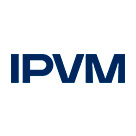

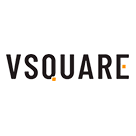


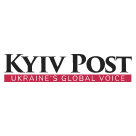

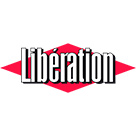
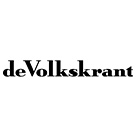
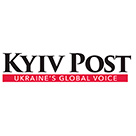

IPVM is the world's leading authority on physical security technology covering video surveillance, access control, weapons detection and more; delivering unmatched reporting, research, and test results.
Materials are published with the permission of the copyright holder.
 Russia is an autocracy
Russia is an autocracyA system of oligarchs and law enforcement cover up tyranny and one another.
Cooperation with Russia entails cooperation with Putin’s regime and maintaining its viability.
 Russia is a terrorist state
Russia is a terrorist statePutin funds its army with taxes paid by businesses not just to seize territories.
Russia has proved itself ready to threaten the whole world with food hunger, nuclear weapons, and natural disasters.
Help bring a message to Dahua and Hikvision partners, customers, and employees: stop cooperating with Russia.
 Dahua Technology Co., Ltd.
Dahua Technology Co., Ltd. No.1199, Bin'an Road,
Binjiang District,
Hangzhou, China
 Dahua Europe B.V. - Netherlands
Dahua Europe B.V. - NetherlandsLouis Braillelaan 80, 2719 EK Zoetermeer
 Dahua Iberia, S.L. - Spain
Dahua Iberia, S.L. - SpainJuan Esplandiú 15 1-B, 28007 Madrid, Spain
 Dahua Technology Italy S.R.L. - Italy
Dahua Technology Italy S.R.L. - ItalyVia Cesare Cantu’, 8/10 20092 Cinisello Balsamo (MI)

One of the world's biggest distributors will stop selling Dahua and Hikvision in North America, a move the company confirmed to IPVM, that deepens the challenges the PRC China manufacturers face.
In this post, based on Wesco corporate feedback, interviews with Anixter branches, and Hikvision's communication, we examine the impact of the move on Wesco/Anixter, its top rival ADI, and the future of Dahua and Hikvision in North America.
This comes just over a week after UK's Largest retailer, Tesco decided to stop using Dahua and Hikvision, joining a long list of entities banning the companies.
Wesco/Anixter Background
Three years ago, Wesco acquired Anixter, transforming the distributor into an even larger security products distribution, combining Wesco / CSC's smaller security unit with Anixter's large one, creating a potentially stronger competitor to ADI.
Wesco's stock has tripled since buying Anixter and the company is surging amidst a broader market downturn.
Wesco/Anixter Response
Wesco has confirmed to IPVM that:
“Wesco is no longer ordering new Dahua and Hikvision products for its inventory in North America and will continue to comply with all applicable U.S., international, and local laws and regulations.”
Wesco declined to explain why they did this, beyond the above allusion to laws and regulations, responding to IPVM that:
“We don’t share that level of detail on our commercial business plans.”
IPVM first heard about it from multiple sources close to the company last week.
Dahua and Hikvision have long faced various legal restrictions so it is not clear which, if any, of them caused Wesco to make this move. Most recently, the FCC new authorization ban officially became law. However, that would not block Wesco from selling existing models (at least for now, the FCC has opened comment on revoking authorizations). Also, Wesco did not explain why they are doing this in Canada, which is, obviously, not subject to US federal law. Even in the US, Wesco could argue, as ADI implicitly does, that it is not illegal generally to sell these products.
Last year, Ingram Micro, PSA, and ScanSource dropped Hikvision USA so there is precedent for this but we estimate Wesco is a larger distributor of Hikvision products than those 3 were together.
Outside North America?
Wesco's statement implies that these changes are only happening in North America, with Wesco replying to IPVM's question about Latin America and Europe with a general statement:
We monitor regulations everywhere we do business and will continue to maintain compliance with the law.
Latin America is still a significant market for Dahua and Hikvision products, so we would expect Wesco to continue to sell these products substantially in that market, based on their statements to us.
Hikvision Confirmation
Hikvision Canada confirmed this news in an email to partners, emphasizing that Wesco "will not be ordering and distributing new Hikvision inventory":
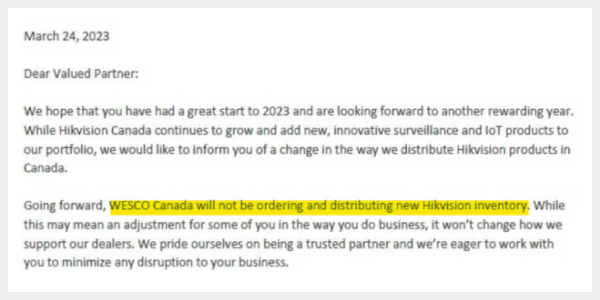
Confusion Amongst Anixter Branches
In IPVM interviews with 5 Anixter branches, the majority were selling Hikvision, with most declining to talk about the move but with one saying they cannot sell them:
- Anixter Elmsford | Security Branch: "We are still selling Dahua/Hikvision products."
- Anixter Cranberry Township | Security Branch: "We still have plenty in stock."
- Anixter Hackensack | Security Branch: "We have several Dahua and Hikvision models in stock." (The brand had no comment on if any messages were coming from Wesco's headquarters.)
- Anixter Inc. Richmond: "Nobody in this company in this country can sell them. It is a security risk."
- Anixter Inc. Dulles: "We don't have Hikvision/Dahua cameras in stock at this branch but we can ship them from Illinois."
Unloading Inventory
A practical consideration for Wesco/Anixter is unloading the millions of dollars of inventory they have. As the distributor itself emphasized, they are "no longer ordering new Dahua and Hikvision products" but they are still selling what they have in stock.
Sources have told us Wesco/Anixter has tried to delay the press (most specifically IPVM) from covering this, which would certainly help them sell the products they still have in inventory.
Wesco USA lists 3,000+ Hikvision models:
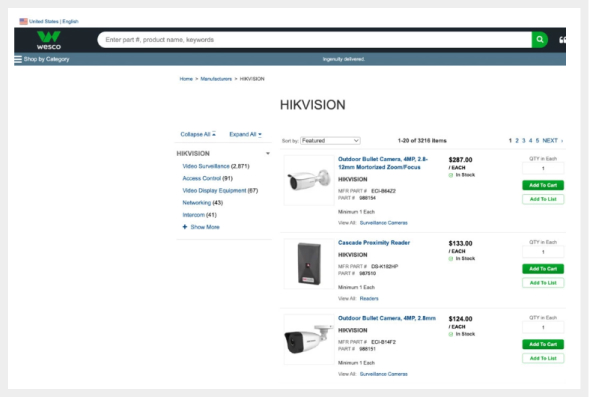
Plus 900+ Dahua ones:
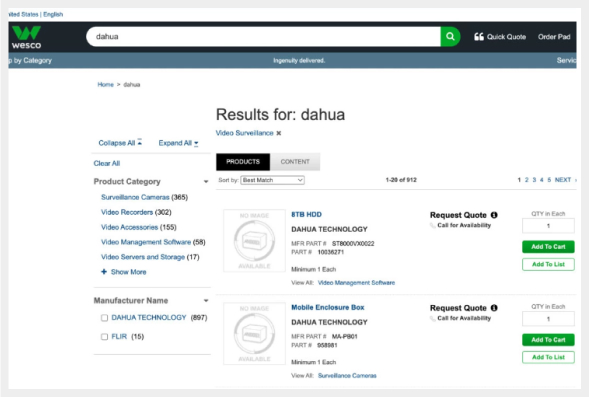
Boon For ADI?
ADI is the one distributor we estimate does more Dahua and Hikvision sales in North America and has shown no public signs of slowing down. For example, see The Naval Officer Who Became ADI President - Dahua And Hikvision USA's #1 Partner.
One possible outcome is that this is a boon for ADI as Dahua and Hikvision customers may shift to buying these products at ADI, as all other remaining distributors are far smaller. As such, ADI could benefit from this move by its biggest rival.
On the other hand, it might now be easier for ADI to drop Dahua and Hikvision as they would themselves have less concern of losing to Wesco if they did this first.
ADI did not respond to our request for comment on this matter.
Bad Signal For Dahua and Hikvision Partners
Dahua and Hikvision have argued for years that such bans and barriers were mistakes that would eventually be corrected. While this could eventually happen, Wesco is so large that both from a practical standpoint (it is where many dealers get their products) and from a signaling standpoint, this puts further pressure on the PRC companies.
Why Now?
We do not know why Wesco has decided to do this now.
Generally, though, the risks are (1) the FCC furthers its action and existing products have authorizations revoked. Since the US FCC deemed these companies a "threat" to "national security" more than 2 years ago, this is possible. Secondly, the US may enact even worse sanctions (so-called "Magnistky" sanctions) that would make it illegal to do business with companies such as Hikvision. Any seller with these products under that outcome would not be able to sell them.
What happens next with the US government and these 2 companies is inherently uncertain (e.g., both are now suing the US government) but Wesco's move shows how serious this has become even to dealers with little knowledge or interest in government affairs.

Tesco, the UK's largest retailer, has publicly banned Dahua and Hikvision cameras over human rights concerns and is working on replacing them.
This is "massive" for the UK sending a clear message to other businesses, dealers told IPVM, with the rights groups which pushed for the move pledging to pressure others.
This adds to Dahua and Hikvision's UK struggles with the UK government prohibiting their cameras in its sensitive sites in November 2022, joining a growing list of organizations banning Dahua and Hikvision.
In this post, IPVM examines this news and its impact.
Tesco Background
Tesco is the UK's largest retailer and has 3,822 supermarkets across the country. Globally, Tesco employs over 345,000 people and had $67 billion in revenue for 2022, making it one of the top 20 largest retailers worldwide. Tesco's core activity is in the UK and Ireland but it also has a presence in Central Europe (in Czechia, Slovakia, and Hungary).
Tesco "Transitioning To New Suppliers" Over Human Rights
On March 16, the CEO of Tesco UK and Ireland, Jason Tarry, sent a letter stating that "we are now in the process of transitioning to new suppliers" after receiving "allegations" that Hikvision and Dahua are linked to "human rights abuse":
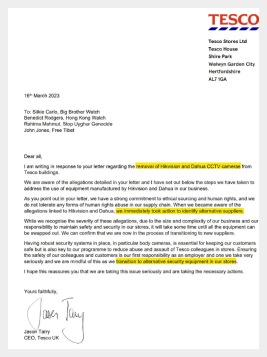
The CEO of Tesco Global is Kevin Murphy and this letter is only from the CEO of Tesco's UK subsidiary, so it is not clear if the ban also applies to Tesco's other stores in Ireland and Central Europe. IPVM has reached out to Tesco to confirm.
"Massive" News For UK Market
A Hikvision partner who requested anonymity told IPVM this was "massive" as Tesco's size "sends a huge message" to others:
“This is massive news as they are the leading UK supermarket chain. This sends a huge message to other such businesses and retailers. Hik does present significant risks with their tie to the Government and Dahua is been pulled along with it. I don't think this is fair on all Chinese brands as they are not all the same!”
IPVM contacted the UK's major Hikvision and Dahua distributors Dynamic CCTV, Oprema,DVS, Fortus, Norbain, and COP UK, and three smaller providers, e.g. CU CCTV but none responded as of press time.
Recently, Hikvision UK partners complained about NDAA criticisms in the UK, emphasizing correctly how this is a US law, though acknowledging that it was becoming a more common pushback against using Dahua and Hikvision in the UK. Tesco's move makes these human rights abuse criticisms far more local to UK Dahua and Hikvision dealers.
Response To Rights Groups Letter
Tesco UK's response came in response to four rights groups - Free Tibet, Big Brother Watch, Stop Uyghur Genocide, and Hong Kong Watch - who sent a letter to Tesco UK on February 22, 2023.
The letter chiefly cited IPVM's reporting about Hikvision and Dahua's $1.2 billion in Xinjiang police deals, their deployment of Uyghur alerts, and Hikvision Cameras In A Concentration Camp Survivor's Cell. The letter also cited the firms' general involvement in providing equipment to the PRC government for mass surveillance purposes.
Citing Tesco's human rights policy, the groups urged Tesco to "remove all surveillance cameras made by Chinese state-owned companies and stop funding technology linked to serious human rights violations in China":

Silkie Carlo, director of Big Brother Watch, hailed Tesco's response as a "HUGE victory".
"We're Already Onto Other Retailers"
Tesco's decision puts pressure on other large private companies to drop the providers. Silkie Carlo, director of Big Brother Watch, tweeted that Tesco's decision is just one "giant domino to fall" and "we're already onto other retailers":
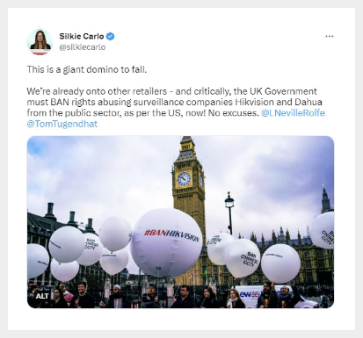
This has a major impact on the UK since Hikvision and Dahua depend overwhelmingly on private-sector business sales, especially as the UK government and police have imposed significant bans on their own usage of the firms' equipment.
Largest Company To Publicly Ban So Far
This is by far the largest company to publicly drop Hikvision and Dahua for human rights abuses. The previous most notable example was Avarn, a Scandinavian security provider with about $1 billion in revenue (compared to Tesco with over $67 billion). Other companies have banned the firms, of course, but not done so publicly and for human rights abuses.
Related, see Where Dahua and Hikvision Are Banned.
Hikvision & Dahua Response
Dahua told IPVM it is "disappointed" at the Tesco ban and said it "has never - and will never" provide technology "designed to target a specific racial or ethnic group":
“We are disappointed to hear of this decision. Dahua Technology is a private-sector, publicly traded company. We are neither owned nor operated by any government. We categorically reject false allegations linking the company to ethical and human rights concerns. Dahua has never – and will never – provide or sell any technology, product or service designed to target a specific racial or ethnic group. As a device supplier, we do not store, manage, or have access to end-user data. We adhere to common standards for security practices in our industry and comply with all applicable laws, regulations, and business ethics of each market in which we operate.”
Note, Dahua claiming it does not target ethnic groups is directly contradicted by the evidence, including from its own documentation:

Bans of Dahua and Hikvision are growing around the world, with new ones being added regularly, making it hard to verify where and when bans are added.
This directory compiles the countries, regions, institutions, and other entities which have publicly banned Dahua and/or Hikvision in some capacity.
Not Comprehensive / Many Not Disclosed
This list is not comprehensive as an unknown number of other government entities and corporations have either informally/secretly made these decisions, in order to avoid controversy or for security reasons.
Executive Summary
Federal government bans of Hikvision and Dahua, to varying degrees, are publicly disclosed in 4 countries (US, UK, Australia, Taiwan). In the EU, the most notable ban is the EU parliament's removal of Hikvision over human rights abuses.
Various sub-national authorities have also passed bans: 5 US states plus Scotland and Wales in the UK, along with the Indian Navy, a New Zealand ministry, an Australian health department, and others. Various companies and institutions, most notably SIA in the US, have excluded Hikvision and Dahua as well.
Overall, this list shows that Hikvision and Dahua are increasingly illegal to install in Western developed countries. However, there are no publicly-known bans in large parts of the world such as Latin America, Africa, the Middle East, and Southeast Asia. Due to this polarization, these regions have now become the largest sources of revenue growth for Hikvision and Dahua.
US Federal NDAA Ban
Due to Section 889 of the 2019 NDAA, the US federal government bans "every executive agency" from trying to "procure or obtain" Hikvision and Dahua and their OEMs over national security concerns. This means the entire US federal government: the US military, the State Department (US embassies), the Department of Agriculture, etc.
- No part of the federal government can buy banned equipment, nor can it obtain products which use banned equipment "as a substantial or essential component", including cameras with Huawei HiSilicon chips.
- The US federal government also bans doing business with any prime contractor that "uses" Hikvision and Dahua gear, applying "regardless of whether that use" is related to a federal contract.
- Finally, the US federal government bans any federal dollars from being spent on Hikvision and Dahua gear, regardless of the specific entity. E.g. a private school may not spend federal grant funds to buy Hikvision or Dahua NVRs.
- For more, read IPVM's detailed NDAA Video Surveillance Ban / Blacklists Guide and the NDAA Compliant Video Surveillance Whitelist.
US FCC Ban
As of November 2022, the FCC has banned new equipment authorizations for Dahua and Hikvision and is weighing whether to revoke existing authorizations as well. This comes after the companies were declared "a threat to national security" by the FCC in 2021.
The FCC has established a pathway for Hikvision and Dahua to submit a plan that, if the FCC approves, would allow them to obtain new authorizations so long as they ensure their products are not marketed or sold for "prohibited purposes" of public safety, critical infrastructure, national security, and government.
US State And City Bans - Louisiana, Nevada, NH, SD, Wisconsin
Taking their lead from the federal NDAA ban, several US state and city authorities have also banned Hikvision and Dahua purchases and usage over national security concerns.
- In January 2023, several states passed Hikvision and Dahua usage bans: Nevada, South Dakota, and Wisconsin. These apply to state agencies, employees, and contractors.
- Also in January 2023, New Jersey banned Hikvision and Dahua, applying to "departments, agencies, commissions, boards, bodies, or other instrumentalities of the Executive Branch of New Jersey State Government."
- In March 2023, Nebraska announced it is "banning the state of Nebraska and its contractors from using" Hikvision and Dahua gear.
- In 2022, New Hampshire's state government banned the use and purchase of Hikvision and Dahua, as well as Louisiana's procurement code.
In terms of cities, in 2018, the city of Suffolk, Virginia, banned Hikvision and Dahua.
US SIA ISC West Attendance/Membership Bans
In 2023, the Security Industry Association (SIA), barred Dahua and Hikvision from exhibiting at ISC West. In June 2021, SIA expelled Dahua over ethics code violations. A month later, Hikvision quit SIA while facing expulsion over ethics code violations.
United Kingdom / Scotland / Wales
On a national level, the UK government stated in November 2022 that it would "cease deployment" of "equipment onto sensitive sites" that is "produced by companies subject to the National Intelligence Law of the People’s Republic of China":
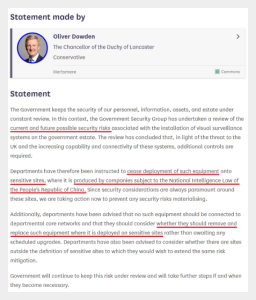
Scotland, which is part of the UK but has a separate government, decided to replace Hikvision for government use as part of a program to improve security, a spokesperson confirmed to IPVM in November 2022:
“The Scottish Government is in the process of replacing and upgrading security equipment across its estate as part of a multi-year improvement programme.
All existing CCTV kit and equipment, including Hikvision and other companies’ products, are being replaced with a new integrated system to improve and future-proof the security of the Scottish Government estate. [emphasis added]”
Finally, the government of Wales (also part of the UK but with a separate administration), along with two Welsh police forces, are changing their Hikvision surveillance systems or freezing use, according to the BBC.
UK City and County Bans
Several UK cities and town councils have banned or removed Hikvision and/or Dahua:
- The Scottish capital of Edinburgh removed its Hikvision cameras as part of a major $3 million upgrade in 2022.
- In 2023, some local authorities in the county of Kent have decided to remove Hikvision over fear that sensitive data is "fed back to the Chinese Communist Party via Hikvision's cameras". Those local authorities are Tonbridge and Malling Borough Council and Sevenoaks District Council.
The above bans were for national security reasons. Other authorities have cited ethics and human rights.
In 2021, the Tunbridge Wells Borough Council, also in Kent, issued a tender for a small video surveillance project specifying "we have decided not to procure Hikvision, Dahua, Uniview, or Kedacom" due to their "ethical implications".
Also in 2021, the London borough of Tower Hamlets "made a conscious decision" not to procure "Hikvision and other Chinese CCTV" over human rights, per Big Brother Watch:

Tower Hamlets has the highest proportion of Muslims in the UK, at ~38%, and has been active on Uyghur issues.
UK Military Ban
In 2021, IPVM and Free Tibet revealed that the UK Ministry of Defence quietly issued guidance "not to use/install Hikvision equipment":

The MOD declined to comment specifically about this guidance to IPVM, however, it stated it has "a range of measures in place to ensure the integrity of our security arrangements", pointing to national security concerns.
UK Health Department Ban
The UK's Department of Health and Social Care banned new Hikvision camera purchases in 2022, according to The Telegraph, with IPVM confirming that the department procured legal advice on removing existing cameras as well.
Taiwan Ban
In 2021, Taiwan banned using PRC China tech products across its government, including Dahua and Hikvision, ordering these be removed by the end of the year: https://www.youtube.com/watch?v=EA3FATU5Ql4
The broad ban includes PRC hardware, software, and services "in order to avoid theft of government and intelligence information" and avoid "risking national cybersecurity".
Violations of this ban have been found since, e.g. Secretly Relabeled Hikvision Sales Violated Taiwan Law.
Australia Federal Ban
In February 2023, the federal government of Australia began ripping out Hikvision and Dahua cameras across all its agencies over national security fears, as The Australian reported. This followed an audit led by Senator James Paterson which found over 900 Hikvision and Dahua cameras across federal agencies:
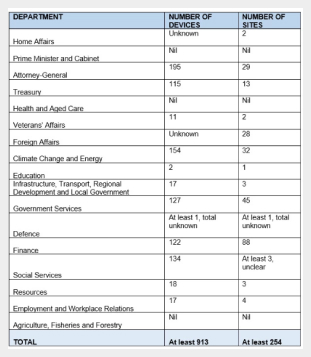
A formal ban of the cameras is also being considered by Australia's Attorney General, Mark-Dreyfus. The Australian defence and foreign ministries were the first to investigate and replace their devices.
Australian Military Ban
In 2018, the Australian military removed Hikvision cameras at an air force base following an investigation by Australian media ABC. The defence ministry confirmed it would remove and replace any other Hikvision cameras as well.
Australian Victoria Police Ban
Australian newspaper The Age reported in February 2023 that police in the Australian state of Victoria "will replace all Chinese-made cameras" by the end of 2024.
Australian City of Geelong Ban
In February 2023, The Age reported that the Australian city of Geelong will replace "a number of Hikvision and other Chinese-made CCTV cameras" used by authorities.
South Australian Health Department Ban
In 2020, the state of South Australia's Health Department removed its Hikvision cameras due to "security concerns".
Australian Public Broadcaster Ban
In 2023, Australian state broadcaster ABC told NCA Newswire that "work is underway to remove the cameras" after Hikvision and Dahua cameras were identified at its Sydney headquarters.
Indian Navy Ban
In 2021, according to Indian magazine The Week, the Indian Navy "has asked all its bases and units" to remove PRC cameras, "especially" Hikvision cameras. An internal memo obtained by The Week stated, "Compromise of a CCTV system could also compromise the security of military establishment".
EU Parliament Removal
In 2021, the EU Parliament voted 627-37 to remove its Hikvision cameras, citing human rights abuses: https://twitter.com/larawoltersEU/status/1387387803135315969.
In contrast, the EU Commission (the executive branch of the EU, akin to the US White House) decided to keep its Hikvision cameras.
Danish Capital Region Ban
In 2022, the Danish Capital Region (Region Hovedstaden), one of Denmark's five regions (equivalent to US states) and including Copenhagen, called Hikvision a "critical threat to security" and banned them, per a declassified briefing:
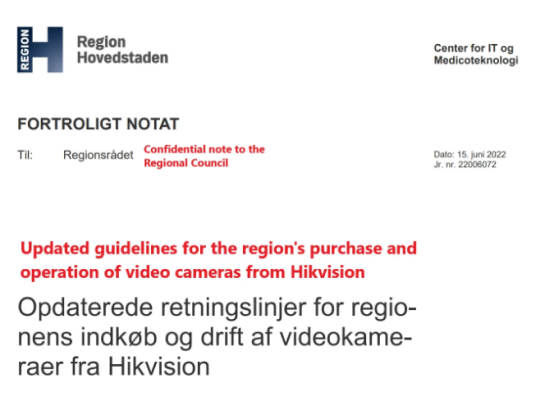
This came after Denmark's intelligence agency warned against PRC-made cameras in earlier 2022, calling out Hikvision's vulnerabilities and PRC data laws mandating PRC firms cooperate with national intelligence.
New Zealand Ministry
In 2022, the Ministry of Business, Innovation and Employment (MBIE) in New Zealand told media that it takes human rights "very seriously" and therefore "will exclude" Hikvision from its suppliers.
Note, the New Zealand federal government said in February 2023 it is 'not taking action' on Hikvision and Dahua cameras despite Australia's move to do so.
Corporate Entities & Institutions
Various companies and other institutions have publicly announced they are not using Hikvision and/or Dahua:
- Avarn, Scandinavia's biggest security provider by revenue, publicly dropped Hikvision over human rights in 2021.
- Scottish integrator CSS publicly dropped Hikvision in 2022 for "abhorrent behaviour not only to minority groups but its own indigenous people"
- The Norwegian Government's Council on Ethics announced in 2020 that Hikvision's rights abuses are "ongoing" and said it was not invested in the firm.
- Nelly's has dropped Hikvision (2021) while Bosch (2020) and Honeywell (2022) have dropped Dahua.
- Western Digital and Seagate stopped selling to Dahua over 2022 semiconductor sanctions, along with Ambarella.
- Republic Services, a Fortune 500 company, barred Dahua and Hikvision over cybersecurity concerns in 2017.
- Genetec expelled Hikvision in 2016 and dropped support for Dahua and Hikvision in 2020 over national and cyber security concerns.
- Milestone continues to support Hikvision and Dahua plugins/devices but discontinued partnerships with the firms in 2022; Milestone ended Hikvision's Elite Partner status in 2019.
- Tesco, the UK's largest retailer, publicly banned Dahua and Hikvision over human rights concerns and is working on replacing them, it stated in March 2023.
- UK startup Facewatch said it dropped Hikvision "for new installs" in March 2023.
Of course, many other companies and entities have stopped using the firms, but have not confirmed this publicly.
Almost No Known Reversals, Aside From ONVIF
IPVM could find no public evidence of entities reversing their bans aside from, notably, ONVIF, which reactivated Hikvision and Dahua in October 2022 as US sanctions terms were adjusted.

The Australian federal government is removing every Hikvision and Dahua camera across its agencies and considering a formal ban similar to the US NDAA.
In this report, IPVM highlights which executives Hikvision is sending to Australia to address the government action, as well as examines a letter IPVM obtained that the company sent to end users addressing the potential action.
Removals Across Australian Federal Government
According to newspaper The Australian, the federal government is "quietly stripping out" all the cameras identified by Senator James Paterson in an audit which found over 900 Hikvision and Dahua cameras in use by various departments:
“The federal government is quietly stripping out every one of the almost 1000 Hikvision and Dahua devices found in government buildings across the country, as the extent of the links between the two companies and the Chinese Communist Party is revealed.
While the Defence, Finance and Foreign Affairs departments publicly announced they were removing the cameras, along with the National Disability Insurance Agency and Australian War Memorial, it is understood every department has decided to audit and remove their CCTV and other recording devices provided by the two companies. [emphasis added]”
The decision to remove the cameras across all federal agencies in Australia is a first, as previous efforts were more scattered. After Senator Paterson's audit, the Foreign Ministry and the Defence Ministry announced separately that they would remove their Hikvision/Dahua cameras, and in 2018, the Australian military removed Hikvision from certain bases.
Australian security insiders told IPVM the ban would harm Hikvision and Dahua's image but do little to dent the cameras' popularity in the cost-conscious SMB segment, for now.
Formal Ban Looms
A formal ban of the cameras is being considered by Australia's Attorney General, Mark-Dreyfus, The Australian also reported:
“The decision comes ahead of formal advice being provided to Attorney-General Mark Dreyfus about whether a formal ban is required”
The government currently led by Prime Minister Anthony Albanese is "likely to accept" the Attorney General's advice if he recommends a ban, business publication Innovation Australia reported.
Hikvision Tells End Users "Not A Threat"
In a letter exclusively obtained by IPVM, Hikvision Oceania's managing director Evan Liu told partners that Hikvision is "not a threat to national security in Australia" and its products "do not send data to China":
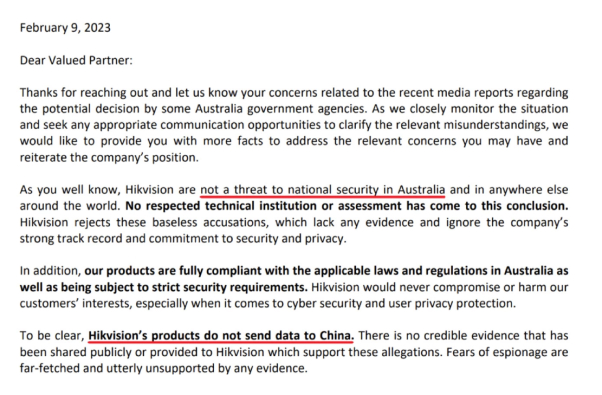
This echoes previous Hikvision cybersecurity arguments, e.g. its 64-page submission to the FCC which claims air-gapping negates FCC concerns, despite clear issues identified by IPVM.
Hikvision also told its Australia partners that it "respects human rights" and touted its hiring of Pierre-Richard Prosper, the former US State Department Ambassador for War Crimes Issues, who has claimed Hikvision did not "knowingly" commit rights abuses in Xinjiang.
Flying Over Chuck Davis, Ambassador Prosper
In response to the action, Hikvision is trying to reassure its Australian partners it is "not a threat" by flying over cybersecurity director Chuck Davis and ambassador Pierre Richard-Prosper, the former US State Department Ambassador for War Crimes Issues, who has claimed Hikvision did not "knowingly" commit human rights abuses.
Hikvision also announced an ESG (Environment, Social, Governance) Conference on March 15 to "glean more insight into the legal landscape that Hikvision operates in and its global responsibilities that Hikvision is committed to fulfilling":
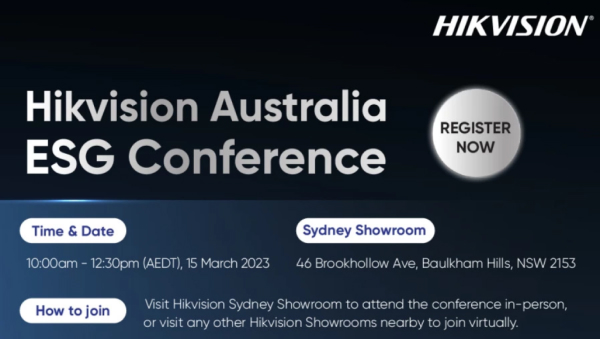
The conference includes speeches by Chuck Davis, Hikvision's Global Information Security VP, on "cybersecurity and vulnerability disclosure" and Ambassador Pierre-Richard Prosper the topic of "human rights compliance":
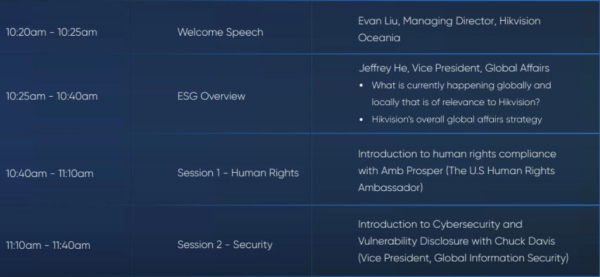
Impact Examined
Australian integrators and security dealers agreed that the ban harms Hikvision and Dahua's reputation but would not impact their SMB-focused sales in the near term.
E.g. Australian integrator Cambpell Chang, who works at Kappalyn Security near Sydney, said Hikvision and Dahua will continue to "have a significant presence in SMB" despite a federal or even possible state government ban:
“I think at some point that it will be [banned] from state government sites as well, but will still have a significant presence in SMB. They still have a significant price advantage. As an example retail for a 2366G2 Hikvision turret is A$284 ($195 USD). The equivalent Hanwha 8011R is A$324 ($223 USD). [emphasis added]”
Daniel Lewkowitz, CEO of Calamity Monitoring in Sydney, agreed:
“Most government departments were already specifying e.g. Axis, Bosch etc. It's only some obscure ones that weren't paying attention and went with Hikua. Will have no impact on private sector installs, homes, businesses etc. [emphasis added]”
Another integrator, who requested anonymity, concurred, but said their firm will "transition" away as avoiding Hikvision and Dahua becomes more "mainstream":
“All [this ban] has done is popularize, make more mainstream [avoiding Hikvision and Dahua]. The industry hasn't been putting in Hikvision and Dahua anywhere near government and high-end projects since the Trump presidency. Although, not as far as ripping cameras out. This is the first time. The price conscious market will still be interested. There's still a lot of smaller integrators out there that sell on price and don't understand what they're doing. But we have to transition. [emphasis added]”
Note, over a longer timeframe (5-10 years), a serious market decline in Hikvision and Dahua could still happen, even for SMB. It took some years for the companies to lose significant market share in the US after the NDAA ban passed in 2018.
A formal Australia ban will also impact the rest of the Oceania region, e.g. New Zealand media is now asking NZ government officials if they will also remove Hikvision and Dahua like Australia is doing (the government is 'not yet' doing so.)
Hikvision, Dahua No Response
IPVM request comment from Hikvision and Dahua but they did not respond. If they do, we will update.

Dahua and Hikvision will not be exhibiting at ISC West 2023 in 2 months, nor any other SIA sponsored events, SIA confirmed to IPVM.
This is a blow to the two mega-PRC companies as they struggle with sanctions, the NDAA ban, and the FCC order, among other US government actions.
In this report, IPVM examines SIA's position, contrasting it to ASIS, who welcomed Hikvision to their expo, and how this impacts Dahua and Hikvision's future.
SIA Statement
SIA explained to IPVM that:
“More than two years ago, SIA adopted a Code of Ethics for our members. Any exhibitor at SIA operated events should share this same commitment to this baseline for ethical behavior and exceed these principles in practice. Exhibitors at SIA events are SIA members who have indicated that they will abide by the Code. Dahua and Hikvision are not SIA members or exhibitors at SIA events.”
Ethics Code and Expulsion
In 2020, SIA adopted an ethics code.
In June 2021, SIA expelled Dahua over ethics code violations. A month later, Hikvision quit SIA while facing expulsion over ethics code violations.
Both companies have faced numerous well-documented allegations of human rights abuses, including from the US government. Also, e.g., see Hikvision, Xinjiang, Uyghurs & Human Rights Abuses - White Paper and Dahua Racial Analytics And Human Rights Abuses - Explainer Video.
ASIS and Hikvision
Five months ago, Hikvision exhibited at ASIS' GSX show with a sizeable booth. ASIS, which is ostensibly focused on security practitioners, refused to comment on why they allowed Hikvision.
ISC Events
SIA's most sizeable sponsored events are ISC West (occurring this March in Las Vegas) and ISC East (occurring in November in Manhattan). ISC West is the largest North American physical security event, with roughly double the attendance of ASIS and triple that of ISC East. ISC Events are produced by RX with SIA as the "Premier Sponsor".
Dahua and Hikvision have not exhibited at either ISC event since before the pandemic, in 2019.
Not At ISC West
Given ISC West's size, it is the most important physical event for those looking to sell in North America and it also has an impact on some buyers outside of North America who come to Las Vegas.
Having a booth at ISC West would have been quite helpful for Dahua and Hikvision to signal to buyers that the US government's actions are to be disregarded and that its human rights abuses are to be ignored.
While it is hard to estimate the exact value, certainly some existing dealers seeing Dahua and Hikvision at ISC West would be reassured. Likewise, not being at ISC West may help motivate those dealers to look for Dahua and Hikvision's competitors (ranging from Korean companies such as Hanwha to Taiwan companies such as Vivotek and PRC domestic rival Uniview, which does have an ISC West 2023 booth, see Top Alternatives to Dahua and Hikvision).Attending Possible
Dahua and Hikvision salespeople could attend and walk the show floor, trying to talk to customers or partners or even hold events off-site. While this is often done by smaller companies, it is significantly less impactful than being on the show floor where the mass of attendees are and can easily stop in to meet with company representatives.
Dahua and Hikvision Response
Dahua initially replied to IPVM when we asked them generally about why they were not attending:
“We make decisions about exhibiting our products at various venues based on internal business considerations and it is accurate to report that we will not exhibit at ISC West this year.”
However, Dahua did not respond once we shared SIA's statement and asked for a response to that.
Hikvision did not respond to our requests for comment.
Outlook
While ISC West alone will not make or break Dahua or Hikvision, this adds to the mounting barriers that the companies face in North America, with no sign of how this would reverse, without major shifts in those companies or international relations with the China Communist Party.

Scotland's capital city, Edinburgh, is removing its Hikvision cameras as part of a major $3 million upgrade, the government confirmed to IPVM, explaining why.
This comes days after Hikvision confirmed it faced declining sales in both North America and Europe.
In this report, IPVM examines this deal, with an explanation from Edinburgh, why Hikvision lost, and its broader impact.
$3 Million Edinburgh Camera Upgrade
Edinburgh is currently replacing its camera system because many of its cameras "are no longer made and can no longer be maintained" and new cameras will "improve our proactive monitoring and response to events in the city":

The project is worth $3 million (£2.65 million British pounds) and was won by UK integrator North SV:

The project is due to be completed by February 2023.
Hikvision "Not Compatible" With VMS, Removed
Edinburgh City Council told IPVM the upgrade will remove Hikvision "as it is not compatible with the video management software at the core of the system design":
“The public realm network, once fully upgraded, will not feature HikVision equipment as it is not compatible with the video management software at the core of the system design. [emphasis added]”
Furthermore, Edinburgh will replace all analog cameras, including Hikvision ones, in its "corporate estate" i.e. property owned by the City:
“Any camera equipment purchased to replace analogue equipment in the corporate estate will be replaced in accordance with Data Protection Action 2018, the National Cyber Security Centre principles, ONVIF standards and ultimately will also need to be compatible with the modern software it will be integrated into. [emphasis added]”
IPVM asked which specific VMS the Council is using, however, it did not respond. UPDATE 12/12: North, the integrator for the Edinburgh project, posted a photo of the new system on LinkedIn, confirming that Genetec is indeed the new VMS."No Hikvision Cameras Present"
During a city council meeting on October 27, Councillor Lewis Younie asked the Council whether it is removing Hikvision cameras "which are linked to human rights abuses in the People’s Republic of China".
The Council confirmed Hikvision is being removed as part of the upgrade but did not specify the reason:

Younie is part of the Scottish Lib Dems, the First European Political Party To Call For A Hikvision Human Rights Ban, with its leader Alex Cole-Hamilton urging Hikvision be "removed from the entire Scottish Government estate" in July 2022.
VMS In Use Unknown - UPDATE Genetec confirmed
IPVM was unable to confirm which specific VMS is being used for the project and has filed a Freedom Of Information Request for full details of the winning bid.
Genetec declined to comment on whether its VMS is in use for the Edinburgh project:
“Genetec does not discuss specific end user installations.”
Genetec stated that, as a general policy, Hikvision and Dahua cameras are "automatically blocked" from its platform with some exceptions for "specific end users to transition them off":
“When we detect a Hikvision or Dahua camera, its connection to our platform is automatically blocked. In some instances we make arrangements with specific end users to transition them off their existing Hikvision/Dahua devices over a period of time wherein these legacy devices will work on our platform (with no technical support during the transition period). We no longer have additional licensing fees as we no longer support or allow these devices on our platform.”
North, the integrator for the Edinburgh project, posted a photo of the new system on LinkedIn, confirming that Genetec is indeed the new VMS:

Here is the post which was 'liked' by Genetec Marketing VP Andrew Elvish:

ONVIF Requirements Examined
In 2020, Hikvision was blocked from ONVIF conformance over its US human rights sanctions, although its ONVIF access was reactivated just last month (October 2022).
When the Edinburgh camera project specs went live in 2021, Hikvision was still blocked from ONVIF and the Edinburgh project clearly states the camera manufacturer "must have current access to the latest ONVIF test tools":

The specs also state that the VMS manufacturer must "have full access to the latest ONVIF test tools" and "must not be on the ONVIF 'entity list'" (which Hikvision was on at the time:)

Although VMS compatibility was the issue according to Edinburgh Council, such requirements effectively excluded Hikvision as well. Note, ONVIF restrictions caused Hikvision to lose out on a massive $73 million Italian government project last year.
Hikvision's Europe Struggles
Whether for technical or human rights reasons, Hikvision is struggling in Europe:
-
EU Parliament removed its Hikvision fever cameras for "contributing to serious human rights abuses"
-
In the UK, the new Security Minister is calling for a Hikvision ban, urging the UK "stop buying any technology the facilitates repression in Xinjiang"
-
One of Scandinavia's biggest security firms, Avarn, dropped Hikvision over "risk that Hikvison will contribute to human rights violations"
-
Denmark's capital region banned Hikvision purchases due to being a "critical threat to [cyber]security"
-
In Italy, state TV has investigated Hikvision twice
-
In Ireland, an Irish politician and Irish human rights groups are calling for a Hikvision ban
Hikvision has admitted this, noting "negative growth" in Europe and North America in its latest earnings call but strong growth in Latin American, Asia, and Africa, deploring "political uncertainty".
The Edinburgh removal is yet another sign that Hikvision will likely need to shift focus to developing countries in the face of long-term Europe market challenges. Hikvision did not respond to our request for comment.
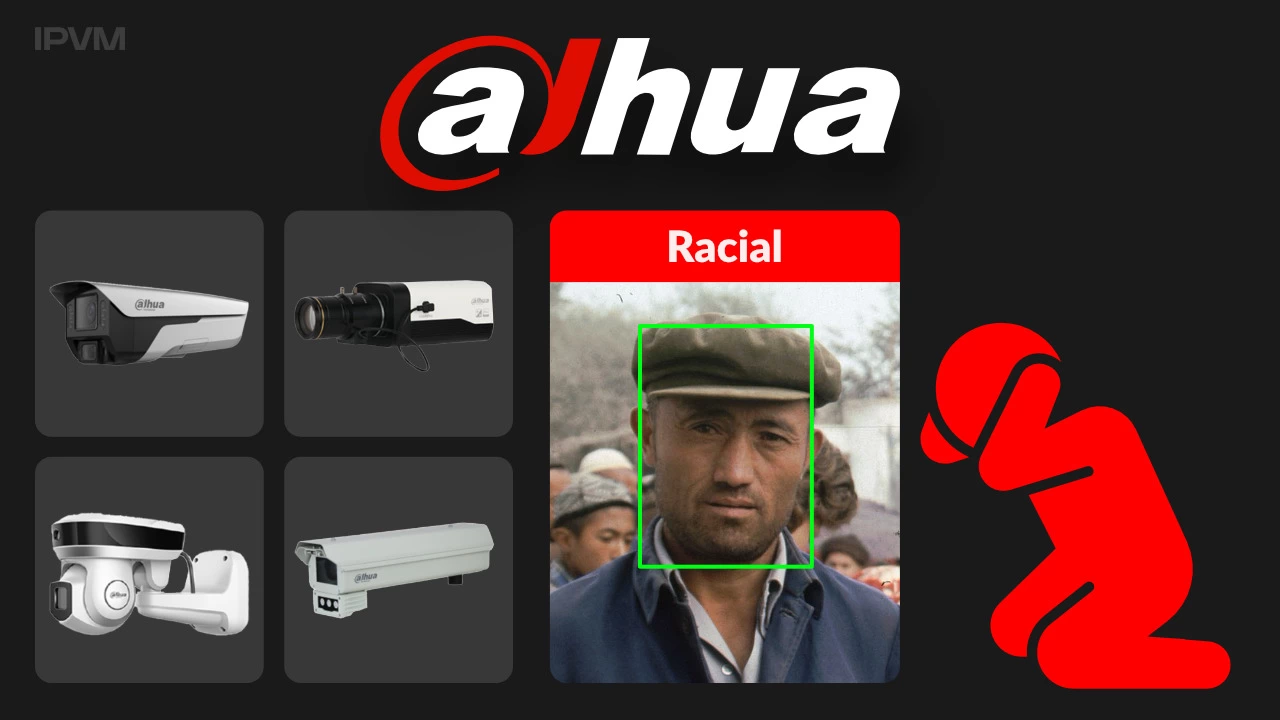
Four Dahua camera models specify video analytics that can detect "race", "skin color", and "Xinjiang/Tibet" facial attributes, IPVM has verified on Dahua's own website.
Dahua admitted the authenticity but alleged it was outdated and that they "appreciate IPVM for pointing out this error", alleging it was not "developed for commercial use" despite being specified in its own product pages.
This is the third case of Dahua offering such analytics, adding to the company's server-based "Uyghur warnings" and its SDK offering Uyghur tracking.
"Smart Features" Include "Race", "Skin Color", "Xinjiang/Tibet" Detection
TheDH-IPC-HF8249F-FD lists "Smart Features" (智能功能) such as "face attribute extraction" (人脸属性提取); among these face attributes are "race" (人种) and "Xinjiang/Tibet (Custom Support Required)" 疆藏 (需定制支持):
“Support face attribute extraction, support 7 attributes, 5 expressions: gender, age, glasses, expressions (angry, calm, happy, sad, surprised), masks, race, beard, Xinjiang/Tibet (Custom Support Required)”
支持目标过滤 支持人脸检测,人脸优选抓拍,人脸区域曝光,人脸区域增强 支持人脸属性提取,支持7种属性,5种表情: 性别,年龄,眼镜,表情(生气,平静,高兴,悲伤,吃惊),口罩,人种,胡子,疆藏(需定制支持)[emphasis added]

TheDH-IPC-MFW8449-ZHM-D47-LI-0832 offers "face attribute extraction" including Xinjiang/Tibet (Custom Support Required)" 疆藏 (需定制支持):
“support face attribute extraction, support 6 attributes, 8 expressions: gender, Age, glasses, expression (angry, sad, disgusted, scared, surprised, calm, happy, confused), mask, beard, Xinjiang/Tibet (Custom Support Required)”
支持人脸属性提取,支持6种属性,8种表情:性别,年龄,眼镜,表情(愤怒,悲伤,厌恶,害怕,惊讶,平静,高兴,困惑),口罩,胡子,疆藏(需定制支持) [emphasis added]
.png)
TheDH-CP835-AU1F-LZF2070 has "face" (人脸) analytics for "race" (人种):
Face (except for the face in the car): age, gender, expression (angry, disgust, fear, happiness, sadness) , surprised, calm, confused), glasses, mask, beard, race
4、人脸(车内人脸除外): 年龄、性别、表情(生气、厌恶、恐惧、高兴、悲伤、惊讶、平静、困惑)、眼镜、口罩、胡子、人种 [emphasis added]
.png)
TheDH-SDT-5A404-C2F can detect facial attributes including "skin color" (肤色):
Functional benefits [...] 2. Face capture and attribute extraction supports 7 attributes and 8 expressions: gender, age, glasses, expressions (angry, disgusted, fearful, happy, sad, surprised, calm, confused), mask, skin color, beard [emphasis added]
功能优势 [...] 2.人脸抓拍及属性提取支持7种属性,8种表情:性别,年龄,眼镜,表情(生气、厌恶、恐惧、高兴、悲伤、惊讶、平静、困惑),口罩,肤色,胡子
.png)
Chinese Characters Examined
The Chinese characters used by Dahua translate directly to "race" and "skin color" in English, e.g. the concept of "race" (人种/Rén zhǒng) and "skin color" (肤色/fūsè lìrú) were covered by PRC state media Beijing Daily in 2013, which wrote that "Carl Linnaeus first proposed the four divisions of skin color 人种 and race 肤色" in the 18th century.
Dahua History of Race/Ethnicity Analytics
In November 2020, Dahua (inadvertently) went viral on Twitter after an engineer posted lines of code from Dahua's SDK showing "EM_NATION_TYPE_UYGUR" next to "维族(新疆)" which means "Uyghur (Xinjiang)". Dahua's SDK at the time also mentioned three distinct 'races' by skin color - "black", "white", and "yellow":
.png)
In February 2021, IPVM and The LA Times revealed Dahua technical documents for PRC police video surveillance systems which included "real-time Uyghur warnings/维族人员实时预警":
.png)
The video below explains how the "Uyghur warnings" worked: https://www.youtube.com/watch?v=kIES320bbSs
Also in February 2021, IPVM revealed that Dahua’s client/end user facing software, SmartPSS, includes "race" as a "face recognition" category:

Finally, IPVM and Reuters revealed a national PRC police video surveillance standard, GA/T 1756-2020, which was co-authored by Dahua and included "skin color" tracking:
.png)
The standard specified that "face attributes" should support "skin color analysis":

The specific skin colors are "white, black, yellow, brown, other":
.png)
Another provincial standard co-authored by Dahua for Henan province police, DB41/T 1514—2017, included "SkinColor" tracking as well.
Xinjiang Projects
Dahua has won nearly $1 billion in huge Xinjiang police projects, including building and operating Xinjiang police station surveillance.
US Sanctions for Human Rights Abuses
In October 2019, Dahua was sanctioned by the US government, which cited "human rights violations and abuses" in Xinjiang as shown below:

Dahua Past Denials Examined
Despite the above strong evidence, Dahua has offered varying rationales and denials for its racial analytics:
-
In November 2020, Dahua told The South China Morning Post that it "does not sell products that feature [an] ethnicity-focused recognition function".
-
In February 2021, following the revelations of its "real-time Uyghur warnings", Dahua adjusted slightly, Dahua changed its position, qualifying that "we never provided products or services for ethnicity detection in Xinjiang, PRC" [emphasis added].
-
In an August 2021 post, Dahua changed its position again, alleging "We have never developed a product or solution designed to identify or otherwise target any specific ethnic group."
-
However, in an August 2022 letter to the FCC Dahua admitted the authenticity of their "Uyghur warning" documentation but alleged that it was a "historical internal software design requirement document" that "was never implemented by Zhejiang Dahua or put into commercial use," despite the detailed product documentation.
Dahua Admits, Deletes, "Deeply Troubled"
Now, Dahua admitted the authenticity of these four camera product pages but told IPVM it was "deeply troubled and concerned" about the material on its own website and had "launched an investigation", stating that "ethnic identification customization" was never developed "for commercial use". Dahua's full comment to IPVM is below:
Dahua is deeply troubled and concerned about the information contained in the screen shots shared with us. Upon receiving this information from IPVM we launched an investigation into the matter and can report the following findings.
The webpages shared with us were published at some point before 2018. Our investigation also found that no ethnic identification customization feature was ever developed for commercial use. As we have made clear on a consistent basis, we have not and never will develop for commercial use any solutions targeting specific ethnic group.
As a matter of company policy, we reaffirm our commitment to never develop solutions to identify a single ethnic, racial or national group. This commitment extends to every market in which we operate, anywhere in the world.
We appreciate IPVM for pointing out this error, and we will keep enhancing our efforts to practice our commitment to never develop products and solutions identifying or discriminating against single ethnic, racial or national group.
UPDATE - Dahua told IPVM it has "never provided any customer of any type" with racial analytics, ignoring IPVM's question asking whether it ever developed or offered a racial/ethnic identification feature for any customer:
We have never provided any customer of any type with a product or solution that targets a specific ethnic, racial, national or other type of group identification.
IPVM has followed up with Dahua asking if it has ever developed or offered the technology. [10/22/2022] Dahua has not responded to this.
.png)
Two UK Labour Party politicians are calling for a national strategy to ban public procurement from Hikvision and other firms involved in Xinjiang, with one urging the government to "root this out."
The remarks showcase momentum for a national UK procurement ban within some members of the leading opposition party.
The UK currently has no unified restrictions, instead instituting scattered bans in the Defence ministry and Health department.
In this report, IPVM examines the remarks and potential impact.
SME4Labour Event
On September 26, the group SME4Labour held an event in Liverpool about "Protecting Public Procurement From Companies Linked To Genocide And Oppression":
SME4Labour is a Labour Party organization which describes itself as providing "a forum whereby SMEs [Small and Medium Enterprises] can work in partnership with the Labour Party and continue to inform our economic policies."
The full event can be viewed on YouTube below: https://www.youtube.com/watch?v=E_YJrAQdJHc&embeds_euri=https%3A%2F%2Fipvm.com%2F&feature=emb_imp_woyt
"Unforgivable" To Buy Tech Amid "Evidence Of Genocide"
During the panel, MP Siobhan McDonaugh stated it was "unforgivable" for taxpayer money to be spent on companies involved in repression while there is "evidence of genocide" and called out a Big Brother Watch report finding 31% of UK police use Hikvision:
It is unforgivable to find evidence of genocide on the one hand, while awarding public service contracts to firms implicated in human rights abuses and technology enabled oppression with the other.
Take Hikvision, one of the principal Chinese companies involved in the construction of Chinese surveillance state and the camps that house over a million Uyghurs in Xinjiang, and yet an extraordinary 31% of UK police forces use Hikvision [emphasis added]
The "evidence of genocide" includes a verdict of genocide last year by the Uyghur Tribunal, which was held in London. Separately, the US Holocaust Museum has found a "serious risk of genocide" last year as well.
"History Will Condemn Our Unforgivable Cowardice" If No Action
MP McDonaugh stated that without action, "history will condemn our unforgivable cowardice":
If we look away, history will condemn our unforgivable cowardice and ask why those empowered did not act. Because this time, no one can say that we didn't know. [emphasis added]
Finally McDonaugh decried a "sheer lack of strategy", contrasting the Health Department's Hikvision ban to UK police continuing to use Hikvision:
on the question of China and the UK is a sheer lack of strategy. How could it be right that the Department of Health [made] a very robust statement [through its ban] whereas the Home Office is allowing the police to have CCTV
McDonaugh also called for the UK to have its own version of Entity List sanctions.
"No Strategy To Root This Out"
Similarly, MP Catherine West lamented that there is "no strategy at the top of government to root this out" referring to Hikvision cameras:
There are so many public sector groups using Hikvision, which is a technical application, which captures data and which is being used consistently in the Home Office and in local government. And there is no strategy at the top of government to root this out.
MP West stated that local bans, like those in the London borough of Tower Hamlets, shows restrictions are "perfectly possible" to achieve, but "why should it boil down to a little bit here and a little bit there".
Says Supports Procurement Ban Amendments
Currently, the closest the UK has to potential restrictions are amendments to the draft national Procurement bill which permit exclusion of suppliers based on "serious human rights abuses". However, this right is discretionary, Hikvision/Dahua are not named explicitly, and the amendments are not final.
MP Catherine West stated "we will be working" to ensure that the final version of the Procurement Bill includes these amendments:
I can guarantee you our support, we will be there making a speech of holding the government to account, we will be working in the lobbies to ensure that some of the government's party [...] those in the Tory party will vote with us on that particular amendment. [emphasis added]
MP West added that "we can have clean hands on this, but it does require the government to do its own work to develop a proper strategy".
Labour Party No Official Stance
IPVM reached out to the Labour Party itself about whether it has an official stance on government usage of Hikvision, Dahua, and other gear made by companies implicated in Xinjiang rights abuses. However, Labour did not respond; if they do, we will update.
Impact Examined
The UK has yet to impose any significant restrictions on Hikvision and other Xinjiang-related surveillance firms. But the fact that Labour MPs are calling for Hikvision restrictions poses long-terms risks for the company.
Labour, while currently in opposition, has a better than usual chance of winiing the UK's next general election, according to the latest polls (although this is no guarantee of victory, naturally). Additionally, while the current UK government shows no signs of imposing restrictions, new members like the Security Minister Tom Tugendhat have explicitly called for Hikvision/Dahua bans.
Such trends pose long-term risks for Hikvision and Dahua's UK presence, as noted by UK distributor CCTV Direct which warned last month to switch to Uniview to "help future proof your business".
Hikvision No Response
Hikvision did not respond to a comment request for this article; if they do, we will update.
Charles Rollet•Published Oct 10, 2022 15:26 PM
The US has imposed export controls on Dahua as part of sweeping restrictions against the PRC chip industry aimed at countering the PRC military and surveillance sectors.
The sanctions come just two days after the US Department of Defense added Dahua to its list of Chinese Military Companies, joining Hikvision. However, Hikvision was not mentioned by the latest US chip sanctions, marking the first instance of Dahua alone being targeted.
This risks harming Dahua's technology development while confirming the firm remains firmly in US crosshairs. Dahua has consistently and strenuously denied PRC government influence. In this post, IPVM examines this news and its impact.
Background: Sweeping Export Controls Announced
On October 7, the Department of Commerce's Bureau of Industry and Security (BIS) announced sweeping export controls against PRC chipmakers "to protect U.S. national security and foreign policy interests":
This was done to restrict PRC ability to buy/manufacture advanced computing chips, supercomputers, and semiconductors, as these items are used for advanced military purposes and to "commit human rights abuses" per BIS:
The announcement of these wide-ranging controls was major news and covered by The New York Times, The Washington Post, The Financial Times, etc.
Dahua Included In Upgraded Entity List
One of the key sections of the expanded export controls include stricter rules for 28 companies already on the Entity List, including Dahua but not Hikvision:
Dahua (and Hikvision) were added to the Entity List in October 2019 over Xinjiang human rights abuses, heavily restricting US firms from selling them US technology.
Targets Acquisition Of Foreign-Produced Tech
These latest sanctions are specifically tailored to stop PRC companies from obtaining "foreign-produced items" that were not previously subject to the Export Administration Regulations (EAR).
This is to ensure the 28 entities do not obtain technology that has been produced outside the US but was made using US parts and software, because "many supercomputer parts and components based on U.S. technology and software are not produced in the United States", per BIS.
Potential Reasoning: Surveillance, Military Involvement
BIS did not explain specifically why Dahua was included. It did state that "certain" companies among the 28 entities listed "are developing supercomputers believed to be used in nuclear explosive activities" while others are involved in "designing stealth technologies, space planes, hypersonic missiles, and other military applications including nuclear weapons design".
It is possible Dahua was added for military-related reasons given that the DoD has already declared it a Chinese Military Company (without providing specific evidence.) However these latest sanctions also specifically called out the surveillance industry, citing PRC production of "AI surveillance tools" that "monitor, track, and surveil citizens":
Dahua may have been listed for military reasons, or human rights/surveillance reasons, or both. The actual listing address for Dahua included its global HQ in Hangzhou and two Dahua offices in Xinjiang:
This indicates concerns around Uyghur surveillance likely played a role (if not the only role) in the decision, given Dahua's provision of Uyghur alerts and huge Xinjiang police deals:
Other PRC Surveillance Firms Added
While Hikvision was not part of these latest sanctions, several other PRC surveillance companies were: Yitu, SenseTime, Megvii, and Intellifusion.
The other non-surveillance entities added are largely tied to the PRC's defense and supercomputing/semiconductor sectors, e.g. seven national Supercomputer Centers and the National University of Defense Technology, a military university.
Impact On Dahua / Stock
This will further hamper Dahua's ability to obtain any advanced chipmaking or computing devices, even if produced outside the US. It also shows that Dahua remains firmly targeted by the US government, potentially for reasons related not just to human rights abuses but also alleged PRC military ties. Past sanctions - e.g. the NDAA ban, FCC ban, and Entity Listing - have always seen Dahua and Hikvision targeted together; this is the first time Dahua is singled out.
Stock Down 10%
Dahua's stock was down the legal maximum (10%) during PRC trading hours today:
Dahua's stock is now down more than 50% for the year:
This means the stock is down to levels not seen since 2015 i.e. 8 years ago.
Dahua Response
Dahua did not respond to IPVM's comment requests. Dahua has repeatedly and emphastically denied any PRC government influence, stating on its website "we are not government owned or directed" but "a private-sector business" and telling the FCC "we serve our shareholders, customers and employees - not the interests of any government".
(Dahua's CEO has previously declared "Always Follow The Party" and state-owned China Mobile acquired 10% of Dahua last year.)
If Dahua responds, we will update this post.
PRC Response: "Most Savage Attack"
PRC state media outlet Global Times accused the US of launching a "most savage attack on free trade":
Additionally, PRC Ministry of Foreign Affairs spokesperson Mao Ning accused the US of wanting to "maintain its sci-tech hegemony" by "abusing export control measures to wantonly block and hobble Chinese enterprise".
Note that in the past decade, the PRC government has systematically excluded non-PRC tech products in its own networks citing national security risks.
A sitting US Senator has called on the US to impose Magnitsky sanctions on Hikvision based on a recent UN human rights report.
The UN's top human rights body recently called out Xinjiang surveillance as "highly invasive" and part of potential crimes against humanity. Hikvision has been preparing for Magnitsky sanctions, although it remains unclear if the White House will impose them.
If more politicians began to explicitly call for Magnitsky sanctions on Hikvision, this increases the risk of these powerful sanctions being imposed, ending Hikvision USA and dealing a serious blow to Hikvision overseas sales.
In this post, IPVM examines these remarks and the potential impact.
"What Are You Doing To Support" Magnitsky Sanctions
On September 21, US Senator Rick Scott (R-FL) wrote to the US Ambassador to the UN (Linda Thomas-Greenfield) that the UN's recent human rights report on Xinjiang represents "an authoritative finding that demands accountability":
Scott asked Thomas-Greenfield seven questions in order for the US "to hold Beijing accountable for its genocide" including "what are you doing to support MagnitskyAct sanctions on companies, like Hikvision":
For more on the UN report, read IPVM's previous article: UN: Xinjiang Surveillance "Highly Invasive", Part Of Possible Crimes Against Humanity.
No Response From US UN Office Yet
The US UN Office has not yet publicly responded to Scott's letter, although it has reacted to the UN Xinjiang report stating that the document "confirms the atrocities and human rights violations" in Xinjiang. IPVM will update this post if/when the US UN responds.
Magnitsky Sanctions Explainer
Magnitsky sanctions go much further than the current NDAA, Entity List, and investment sanctions which limit Hikvision gear usage within the US and restrict the company from obtaining US technology and capital.
Rather, Magnitsky sanctions would block Hikvision from any transactions with US persons and companies and freezes all their US assets. This would end Hikvision USA while essentially forcing other countries and companies to choose between doing business with Hikvision or the US, dealing a serious blow to global operations.
In May 2022, the Financial Times reported that US officials were considering these sanctions on Hikvision although a "final decision has not been taken". Since then, there has been no major update on these deliberations, but Hikvision stated in August that it is preparing for the sanctions just in case by reducing its US dollar exposure and stocking up inventory.
Magnitsky Sanctions Urged Once In 2018
US politicians have called for Magnitsky sanctions on Hikvision once before: a September 2018 letter from 17 US Congress members, including 12 Senators, mentioned Hikvision and Dahua as potential Magnitsky targets:
IPVM covered this development at the time, but Hikvision was never sanctioned in this manner and since then, US politicians have not explicitly called for Magnitsky sanctions on the company, according to an IPVM review.
Impact Examined
The risk for Hikvision is that other US politicians join Senator Scott's call for Magnitsky sanctions, putting more pressure on the Biden administration. While there is no immediate sign of this happening, it remains a possibility, with the critical UN report showing continued serious human rights abuses in Xinjiang.
No Response
Hikvision did not respond to IPVM's comment request. If they do, we will update.











